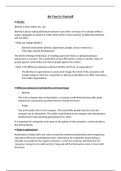Summary
Be True To Yourself Samenvatting
- Course
- Institution
Wil jij je zo goed mogelijk voorbereiden op het tentamen van Be True To Yourself van de opleiding Creative Marketing and Sales aan de Hogeschool Rotterdam, dan is dit de perfecte samenvatting met alle stof die jij moet kennen voor het tentamen. Hopelijk heb je er wat aan en succes met het leren voo...
[Show more]



